Both Pixie-bob and Torby are originated from United States. Both Pixie-bob and Torby are having almost same weight. Pixie-bob may live 3 years less than Torby. Both Pixie-bob and Torby has same litter size. Pixie-bob requires Low Maintenance. But Torby requires Moderate Maintenance
Basic Information
undefined
United States
United States
Life Span:
10 - 15 Years
10 - 18 Years
Colors Available:
cream, silver, black, Tawny
Patches of red, cream, grey
Coat:
Striped with some spots
Short- or long haired
Temperament:
Affectionate, Alert, Cheerful, Curious, Energetic, Gentle, Independent, Intelligent, Lively, Loving, Loyal, Outgoing, Playful, Quiet, Responsive, Social, Sweet, Territorial
Affectionate, Alert, Cheerful, Curious, Energetic, Friendly, Gentle, Independent, Intelligent, Lively, Loving, Loyal, Outgoing, Playful, Quiet, Responsive, Social, Stubborn, Sweet, Territorial
Grooming:
Low Maintenance
Moderate Maintenance
New Owners Friendly:
Yes
Yes
History
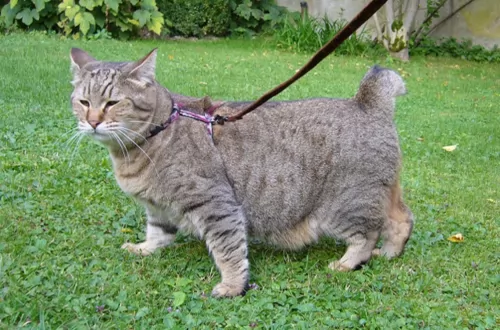 The Pixie-Bob breed is thought to have started from the unplanned litter of a bobcat and a barn cat in 1985. The whole idea of the Pixie-Bob was to get a cat that resembled the North American Bobcat.
The Pixie-Bob breed is thought to have started from the unplanned litter of a bobcat and a barn cat in 1985. The whole idea of the Pixie-Bob was to get a cat that resembled the North American Bobcat.
The barn cat belonged to Carol Ann Brewer, and she named a female kitten Pixie. Pixie became the foundation mother for this breed.
In fact, it was in 1989 that she wrote the first breed standard, naming the breed Pixiebob, in honor of Pixie. In 1998, the Pixiebob achieved TICA championship status. Today, the International Cat Association (TICA) recognizes the Pixie-Bob as a breed.
The Torby is a rare cat and the name ‘Torbie’ is shortened for Tortoiseshell-tabby. They are known for their tri-colored coats. In fact, when a cat has tabby stripes along with Tortoiseshell markings, the results are Torbie.
Tortoiseshell cats are almost exclusively female. Males do exist but they are rare. They’re also referred to as Torties with their coat resembling that of the shell of a tortoise.
The colors represented are usually red, orange and black.
Just like the Tabby cat, the Tortie cat is not actually a breed, but is rather referring to the coat pattern. Pure breed cats such as the Maine Coon can also have a Tortoiseshell pattern.
Description
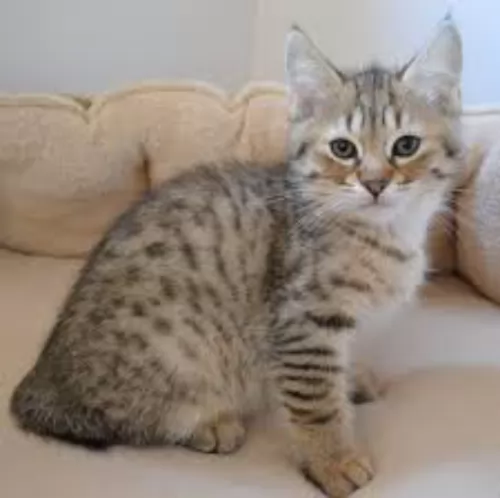 The Pixie-Bob is a medium to large cat that can weigh up to about 8kg. They stand between 25 and 33cm in height.
The Pixie-Bob is a medium to large cat that can weigh up to about 8kg. They stand between 25 and 33cm in height.
It's a muscular cat. These cats have a thick double coat which can be short-haired or long-haired. Most times they have a striped coat pattern with some rosettes. In fact, the pattern on the fur is much like that of a Bobcat.
Their eyes are triangular shaped and they have quite a distinctive heavy brow. The eyes are usually a honey color or they can be green. The tail is rumpy or non-existent or it can be a few inches in length. Sometimes the ears will have some feathering at the tips.
They are polydactyl which means that with their paws, they have more than the regular number of digits.
Temperament:
In spite of there being a wild side to this coat, they are amicable, fairly laid-back type of cats. Pixie-Bobs enjoy being with their owners, loving to quietly spend time with their human beings.
They’re not cats that form a strong bond with just one family member, but they are friendly with everyone in the family. When a stranger calls, they may run off however, to hide in a safe spot.
Some people describe them as dog-like. These cats also have a love for water so don’t be surprised if you see him spending a lot of time playing around his water bowl. This is a cat that just loves being the center of everything that is going on, and yet he has a calm aura about him.
The Pixiebob is talkative, chirping and chattering away as he tells you about what he has got up to during the day.
There is a type of tortie cat that is called a torbie and it comes with tabby-like features. They are striking looking cats and can be medium to large size, weigh between 3 and 7kg and be muscular and athletic.
Essentially when there are tabby stripes you get a Torbie. Some people call them patched tabbies because they are a tabby with
Temperament:
No two Tortoiseshell cats have the same personalities, and because they can be any breed of cat, they have a wide range of personality characteristics.
They can be energetic, docile, curious, lazy, playful, shy, reserved, aloof, social, friendly, angry, calm, or something else. Not every Torbie cat will have the same characteristics, but most make the most awesome pets.
It is true that a cat’s personality and behavior are formed a lot by the people who own it and the lifestyle they provide for it.
Characteristics
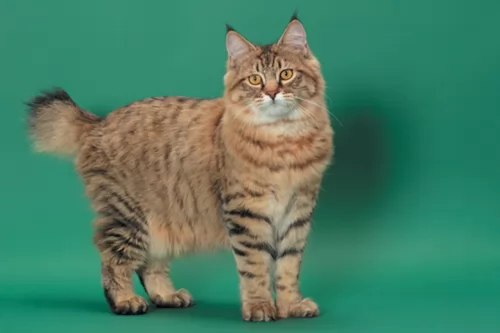 The Pixie-Bob just loves being around his human family and he forms strong bonds with them.
The Pixie-Bob just loves being around his human family and he forms strong bonds with them.
They are social cats and like a dog, they try to become involved in the going-on of the family. By treating this cat well and providing him with a loving home, he is capable of making you a most amicable and energetic member of the family.
Your torbie cat isn't going to turn out the same way as your friend's torbie cat. This is because torbie is just indicating the type of coat your cat has. Yes, they can be strong-willed, social and even angry sometimes, but they can also be quiet, sweet and content. Nothing is set in stone when it comes to a cat's personality.
The type of personality you have and the lifestyle you provide your cat with can play a big part in how your Torby turns out. Give him lots of love and care and you'll be blessed with an awesome friend and pet.
Health Problems
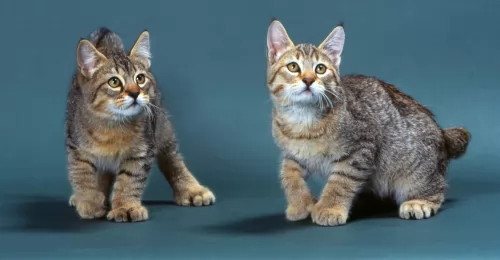 These are healthy cats and they don’t easily get sick. There are always some cat health issues that can crop up with any cat, and with the Pixie Bob, they seem to battle with delivering litters.
These are healthy cats and they don’t easily get sick. There are always some cat health issues that can crop up with any cat, and with the Pixie Bob, they seem to battle with delivering litters.
Sometimes you will hear of Cryptorchidism in these cats which means there is the absence of the testes or scrotum.
Whatever health issues your cat has, always make sure that you get him to the vet for his immunizations as well as for check-ups.
Torbie cats are such lovable felines and because they are describing the type of coat the coat has and not the breed, nobody can be sure how long these cats will live for.
Some will only live to be 10 while others can reach 15 to 18 years of age. The diet and lifestyle you give your torbie can influence his health and longevity.
Health issues in a torbie are certainly not connected to the color of the coat. No matter what cat breed you have, most of the common cat illnesses to watch for are issues that affect the kidneys, the eyes, the skin, and heart.
Make sure you get your torbie vaccinated against some of the deadly cat diseases there are.
Caring The Pet
Diet and Nutrition:
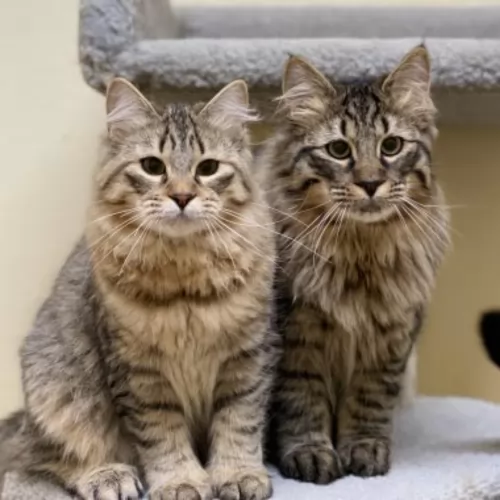 Pixie-bobs don’t require any special diet. When it comes to commercially manufactured cat foods, there are wet foods, dry foods and combination foods. You’ll find out what your cat likes, but remember that a cat is a carnivore and that meat is what they eat.
Pixie-bobs don’t require any special diet. When it comes to commercially manufactured cat foods, there are wet foods, dry foods and combination foods. You’ll find out what your cat likes, but remember that a cat is a carnivore and that meat is what they eat.
Always go for high-quality foods if you are able to because the best foods are better able to keep your cat healthy. The nutritional needs of a cat change as he grows and matures and there are cat foods specially manufactured for every season of your Pixie-Bob’s life.
Always ensure that there is a bowl of clean, fresh, cool water available to your cat.
The short hair of the Pixie-Bob means that it will be easy to give your cat a brush once a week to remove loose hairs.
Always get your cat to the vet when he shows signs of illness. If he comes to you as a kitten he will need his vaccinations as well as worm medicine. Your vet will inform you when to bring you cat in for the next round of vaccinations.
It can be difficult to decide which food to go with for your feline friend as the cat food manufacturers have provided pet lovers with a generous selection.
With a cat, it may be tempting to choose the cheapest option, but in the long run, it will just increase your vet bills. Diet plays a massive role in the health of your cat. The important thing to remember is that your cat is a carnivore and he will require meat as the biggest part of his diet. If in doubt, speak to your vet about the type of food to give your cat and how much.
Ensure your cat has a constant supply of fresh, cool water.
All cats are low-maintenance, and your Torby isn’t going to require much grooming. Make a habit of regular grooming, even if it is only once a week. Your Torby will also need his claws trimmed regularly. You can visit your vet or pet groomer to do this for you.
Just like human parents prepare for the arrival of a new baby, you have to prepare for the arrival of a cat in the home, whether it comes to you as a kitten or an adult.
Make a list of the essential cat accessories you will need.
Buy some fun toys for your Torby, more so if you are bringing a kitten home. Cats need to be stimulated to steer away from boredom.
Essentially your Torby checklist will look like this -
• Litter box and cat litter
• Cat bedding
• Veterinarian-recommended cat food
• Bowls for food and water
• Toys
• Collar with tag and contact info etched in
• Brush for grooming
• Scratching post
• Climbing tree
Comparison with other breeds
- Torby vs Abyssinian - Breed Comparison
- Torby vs Aegean - Breed Comparison
- Torby vs African Serval - Breed Comparison
- Torby vs Chausie - Breed Comparison
- Torby vs American Bobtail - Breed Comparison
- Torby vs American Curl - Breed Comparison
- Torby vs American Keuda - Breed Comparison
- Torby vs American Longhair - Breed Comparison
- Torby vs American Polydactyl - Breed Comparison
- Torby vs American Shorthair - Breed Comparison
- Torby vs American Wirehair - Breed Comparison
- Torby vs Applehead Siamese - Breed Comparison
- Torby vs Ashera - Breed Comparison
- Torby vs Asian - Breed Comparison
- Torby vs Asian Semi-Longhair - Breed Comparison
- Torby vs Australian Mist - Breed Comparison
- Torby vs Balinese - Breed Comparison
- Torby vs Bengal - Breed Comparison
- Torby vs Bicolor - Breed Comparison
- Torby vs Birman - Breed Comparison
- Torby vs Blue Russian - Breed Comparison
- Torby vs Bombay - Breed Comparison
- Torby vs Brazilian Shorthair - Breed Comparison
- Torby vs Bristol - Breed Comparison
- Torby vs British Longhair - Breed Comparison
- Pixie-bob vs Abyssinian - Breed Comparison
- Pixie-bob vs Aegean - Breed Comparison
- Pixie-bob vs African Serval - Breed Comparison
- Pixie-bob vs Chausie - Breed Comparison
- Pixie-bob vs American Bobtail - Breed Comparison
- Pixie-bob vs American Curl - Breed Comparison
- Pixie-bob vs American Keuda - Breed Comparison
- Pixie-bob vs American Longhair - Breed Comparison
- Pixie-bob vs American Polydactyl - Breed Comparison
- Pixie-bob vs American Shorthair - Breed Comparison
- Pixie-bob vs American Wirehair - Breed Comparison
- Pixie-bob vs Applehead Siamese - Breed Comparison
- Pixie-bob vs Ashera - Breed Comparison
- Pixie-bob vs Asian - Breed Comparison
- Pixie-bob vs Asian Semi-Longhair - Breed Comparison
- Pixie-bob vs Australian Mist - Breed Comparison
- Pixie-bob vs Balinese - Breed Comparison
- Pixie-bob vs Bengal - Breed Comparison
- Pixie-bob vs Bicolor - Breed Comparison
- Pixie-bob vs Birman - Breed Comparison
- Pixie-bob vs Blue Russian - Breed Comparison
- Pixie-bob vs Bombay - Breed Comparison
- Pixie-bob vs Brazilian Shorthair - Breed Comparison
- Pixie-bob vs Bristol - Breed Comparison
- Pixie-bob vs British Longhair - Breed Comparison
 Petzlover
Petzlover The Pixie-Bob breed is thought to have started from the unplanned litter of a bobcat and a barn cat in 1985. The whole idea of the Pixie-Bob was to get a cat that resembled the North American Bobcat.
The Pixie-Bob breed is thought to have started from the unplanned litter of a bobcat and a barn cat in 1985. The whole idea of the Pixie-Bob was to get a cat that resembled the North American Bobcat. The Pixie-Bob is a medium to large cat that can weigh up to about 8kg. They stand between 25 and 33cm in height.
The Pixie-Bob is a medium to large cat that can weigh up to about 8kg. They stand between 25 and 33cm in height. The Pixie-Bob just loves being around his human family and he forms strong bonds with them.
The Pixie-Bob just loves being around his human family and he forms strong bonds with them. These are healthy cats and they don’t easily get sick. There are always some cat health issues that can crop up with any cat, and with the Pixie Bob, they seem to battle with delivering litters.
These are healthy cats and they don’t easily get sick. There are always some cat health issues that can crop up with any cat, and with the Pixie Bob, they seem to battle with delivering litters. Pixie-bobs don’t require any special diet. When it comes to commercially manufactured cat foods, there are wet foods, dry foods and combination foods. You’ll find out what your cat likes, but remember that a cat is a carnivore and that meat is what they eat.
Pixie-bobs don’t require any special diet. When it comes to commercially manufactured cat foods, there are wet foods, dry foods and combination foods. You’ll find out what your cat likes, but remember that a cat is a carnivore and that meat is what they eat.